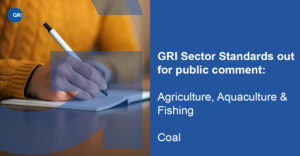
A consultation has launched to gather feedback on two proposed new Standards under GRI’s Sector Program, which will increase transparency within sectors by focusing attention on the sustainability issues that matter most. Adding to the Oil and Gas Sector Standard, which is currently being finalized, the GRI Global Sustainability Standards Board (GSSB) has announced exposure drafts for:
- An Agriculture, Aquaculture and Fishing Sector Standard, covering impacts on biodiversity and natural ecosystems, climate change adaptation; plant and animal health; food security and safety; economic inclusion; and labor standards.
- A Coal Sector Standard, addressing how companies respond to the low-carbon transition, while highlighting impacts on local communities; management of environmental risks; payment transparency; and disclosure on ownership.
The public comment period for the two draft Standards – now open until 30 July – aims to ensure they deliver the global best practice for sustainability reporting in these sectors. The exposure drafts have been independently developed by expert groups, taking account of intergovernmental instruments and sector-related evidence.
Judy Kuszewski, Chair of the GSSB, said: “Inclusive and multi-stakeholder engagement is at the heart of GRI’s standard setting, therefore I encourage organizations and individuals from around the world to contribute to the public comment period for these two draft Sector Standards. Standards for coal, agriculture, aquaculture and fishing are among those being prioritized because these sectors have significant impacts – on areas such as climate change, biodiversity and human rights. Yet our ambition goes much further, with future plans for Standards that cover all major sectors. The Sector Program will enhance the GRI Standards by helping companies within sectors deliver consistent and decision-useful reporting, while encouraging dialogue with other organizations and stakeholders on how to address shared sustainability challenges.”
The public comment period is an opportunity to provide feedback on the clarity, feasibility, completeness and relevancy of the content in the exposure drafts. Final versions of the two new Standards are to publish in 2022.



